Thousands of Americans Deal with Rogue Movers Every Year. Don’t Let it Happen to You.
Avoid Moving Scams
Wheaton moves around 30,000 households every single year. This shows our commitment to client satisfaction. Don’t be another statistic when it comes to moving scams. Keep reading to learn how to avoid rogue movers.
At Wheaton, we believe informed customers make the best decisions. We’re dedicated to ensuring you understand your rights as a customer before choosing your moving partner. We provide every customer with essential documents from the Federal Motor Carrier Safety Administration (FMCSA), a valuable resource detailing your rights. You can also find these documents conveniently linked from our homepage because we believe knowledge is power, and we want you to have that power as you navigate your moving journey.
Simply providing literature isn’t our only commitment. Our skilled move managers are always eager to guide customers, clarifying crucial details, such as the importance of never signing a blank document. We actively promote informed decisions, encouraging customers to gather moving estimates from at least two other companies and conduct comprehensive research. Above all, we invite and value your questions. At Wheaton, we’re not just moving your belongings, we’re moving your life, every step of the way.
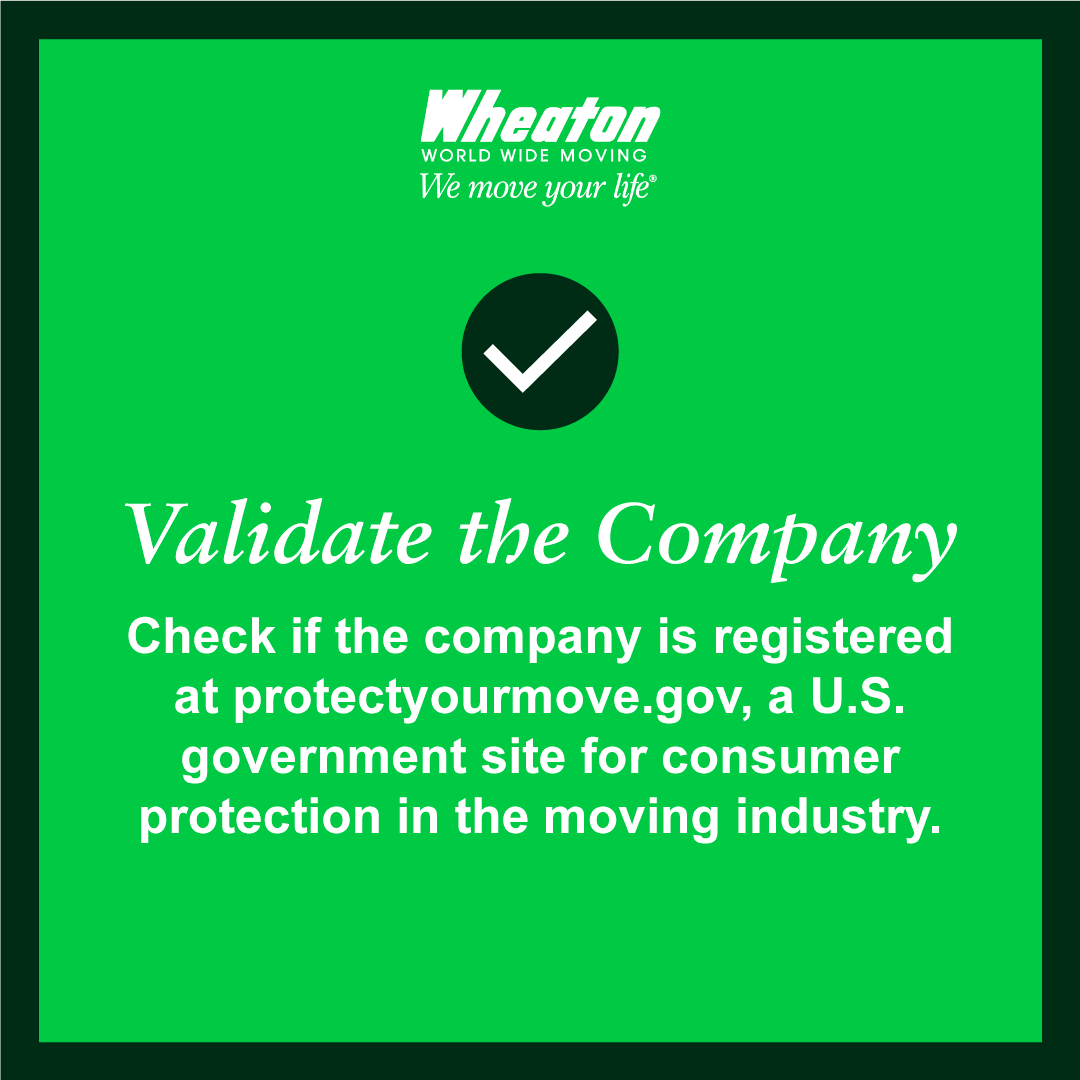
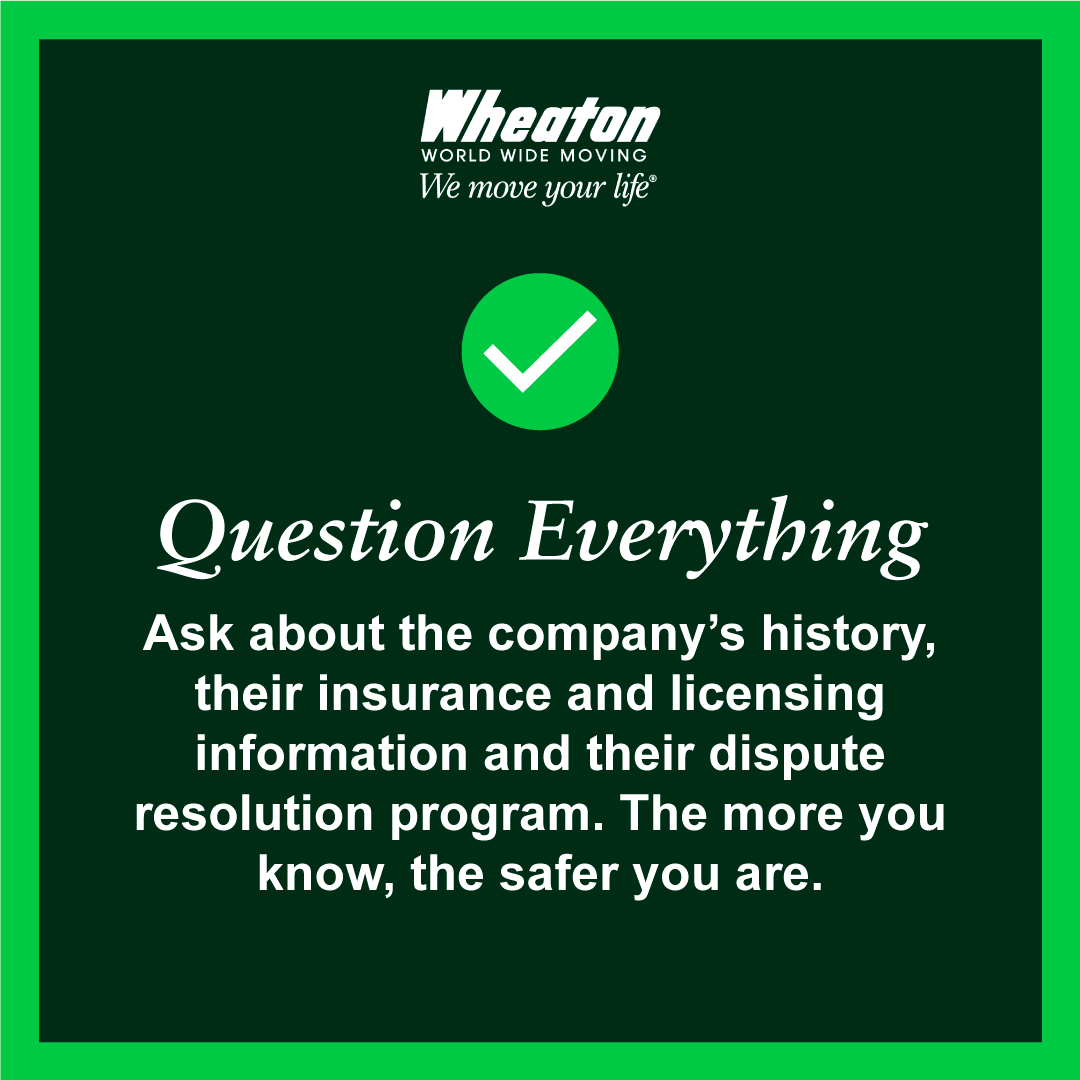

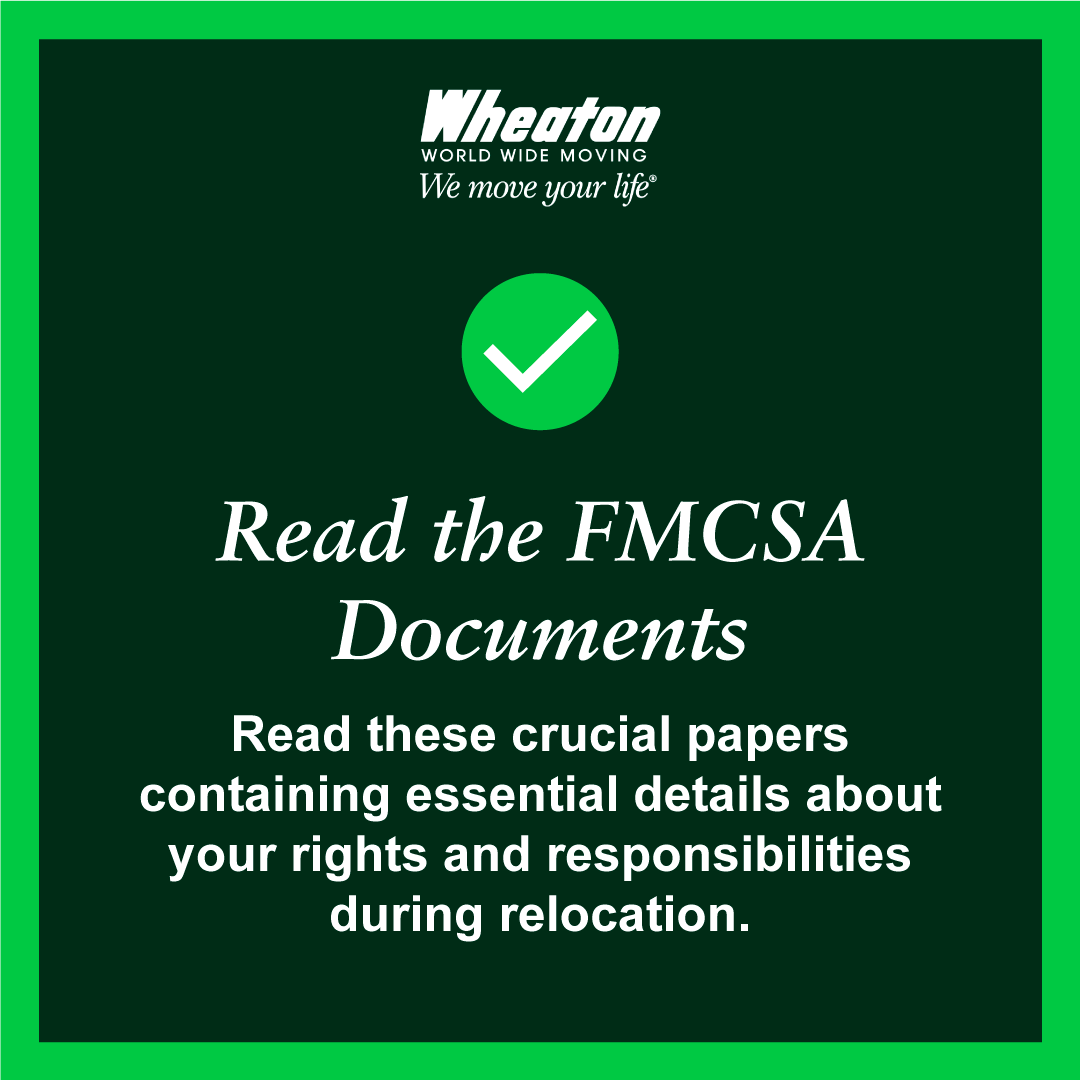
How to Find a Reliable and Legitimate Moving Company
- Always check protectyourmove.gov before signing with a moving company. If the name of their interstate authority’s name doesn’t show on the site, they aren’t a legitimate mover. For instance, our local agent’s names won’t pop up on the list because they get their interstate authority through Bekins; Bekins Van Lines shows up on the FMCSA’s list of registered movers in the database.
- Insured moving companies are essential for a worry-free move. Their insurance signifies commitment to quality service and customer satisfaction. Choose insured movers for a secure, stress-free relocation.
- Your moving company is required by the Federal Motor Carrier Safety Administration (FMCSA) to do a visual survey of your household goods. That can be in-person or virtual using your smartphone or tablet. But if the company gives you an estimate without ever having eyes on your belongings, that’s a red flag that they might be a rogue moving company.
- If you’re asked for a deposit before your move date:
- It should be a nominal amount, nothing close to a third or half the cost of the move.
- Make sure you know who you’re paying and that it is the mover.
- Ask your moving consultant about Full (Replacement) Value Protection (FRVP). FRVP is the agreement with your moving company as to how much your household goods are worth. Moving without FRVP coverage means your household goods are only worth 60 cents per pound per item. Yes, FRVP costs more, but it’s worth the peace of mind.
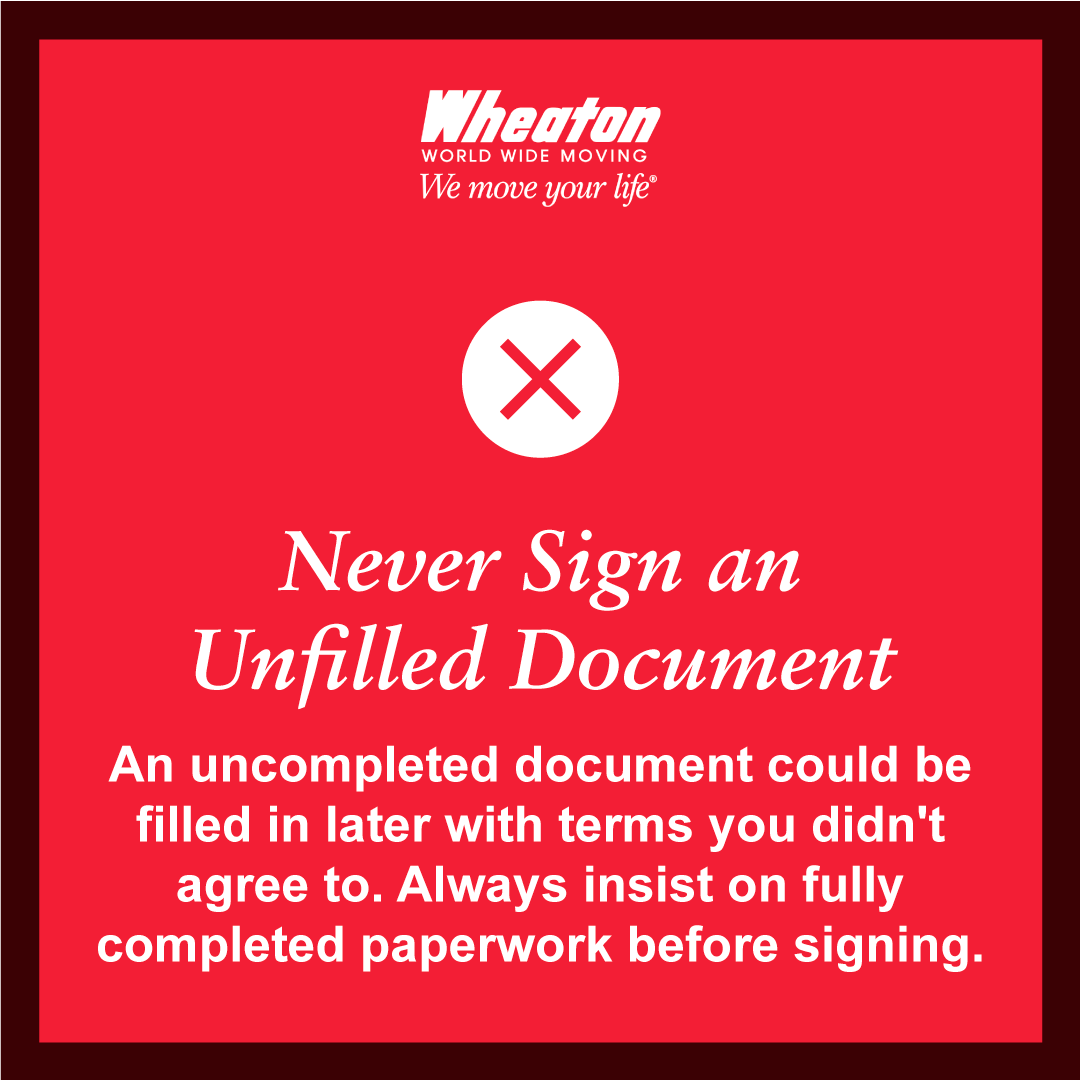

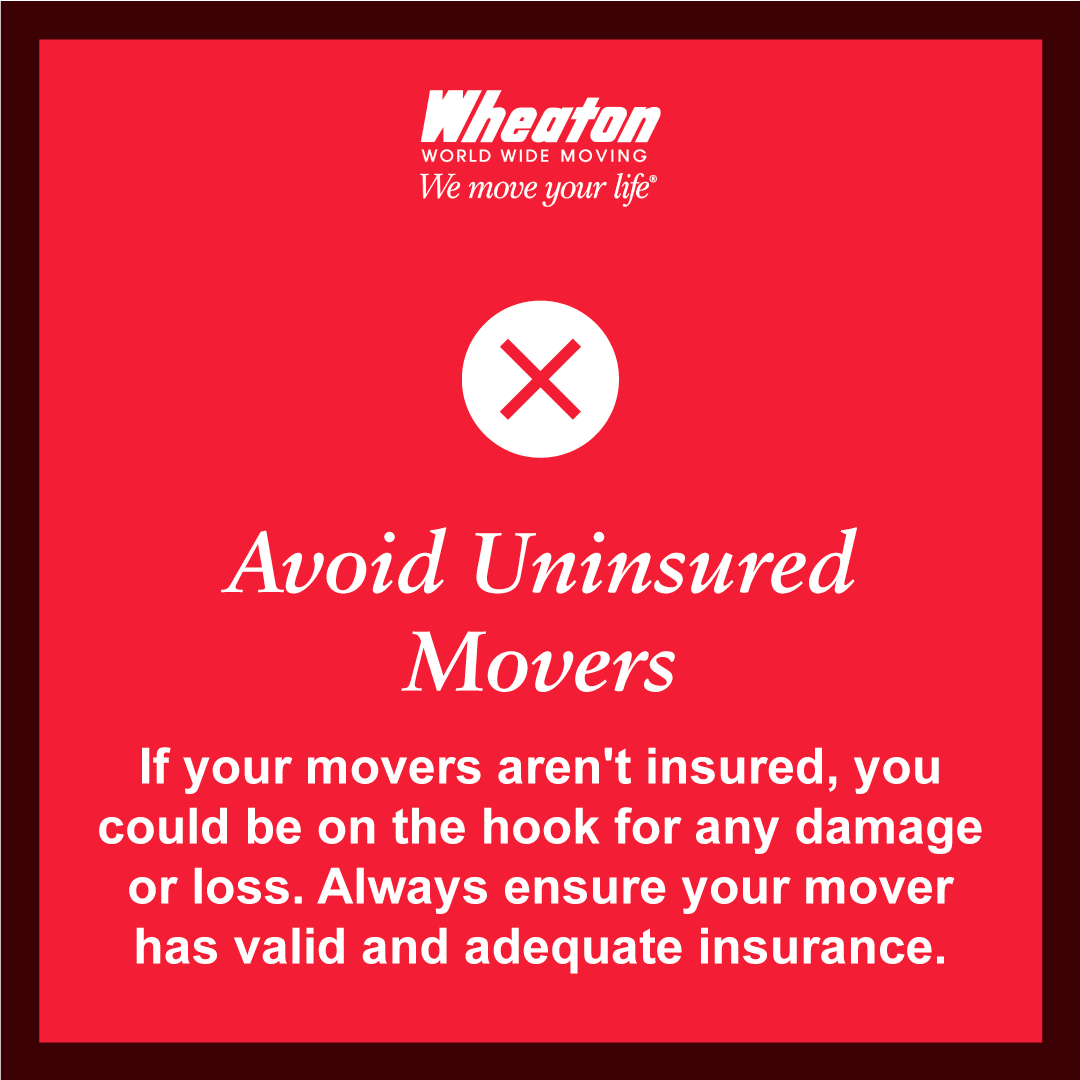

Movers vs. Brokers: How to Tell the Difference
When planning a move, you’ll likely encounter both moving companies and moving brokers during your research. Each may be a valid and legitimate option. However, to know which one is best for your specific situation, it’s important to understand the difference.
Moving Companies
Moving companies directly manage the relocation of your belongings; they own trucks and employ professional movers. Moving companies must be registered with the Federal Motor Carrier Safety Administration (FMCSA).
Moving Brokers
On the other hand, moving brokers act as intermediaries, connecting customers with suitable moving companies; they do not handle the moves themselves. While brokers also need FMCSA registration, they don’t typically own trucks or employ movers.
Being informed helps ensure a smooth, stress-free move. Learn more about the difference between movers and brokers!
Your Certified ProMover Partner: Redefining Moving Standards
Wheaton is a certified ProMover through the American Trucking Associations (ATA). We uphold the ethical and professional standards of the organization, which provides customer service agents to help resolve any disputes involving ProMovers.

If you have questions about how to spot moving company scams or you’re ready to get started with a reliable moving company, get in touch with Wheaton World Wide today. We’re here to help during every step of the process.
Frequently Asked Questions:
With all legitimate moving companies, you will pay the majority of the cost just a few days before delivery or via certified check once the moving truck arrives at your new residence, prior to unloading. Some movers charge a deposit when you book your move, but it shouldn’t be a substantial amount compared to the total estimate. It’s a red flag if your movers ask for a substantial amount of money before beginning the packing or loading process. At Wheaton, we provide moving estimates so you know the expected cost of your move. There will only be a significant change in your final move cost if you significantly change the scope of the move (adding significantly more items to your move, changing your delivery location to a different zip code, adding packing or unpacking services, etc.), which you would approve before any additional services are provided, via your signature on the Bill of Lading (move contract).
Beware of potential moving scams that can turn your relocation into a nightmare. Recognizing these warning signs is crucial to secure a trustworthy moving service:
- Unbelievably Low Estimates: If a moving company offers you an estimate that seems too good to be true, it probably is. Legitimate companies offer competitive, yet realistic pricing based on a thorough assessment of your moving needs.
- No Visual Survey: The FMCSA requires movers to conduct a visual walkthrough of your items before giving a quote, whether in-person or virtual. If a company provides an estimate without inspecting your belongings, they’re violating the rules of the industry’s governmental watchdog.
- Large Upfront Payments: While a small deposit isn’t unusual, beware of companies demanding a large payment upfront. This could be a sign they intend to disappear with your money.
- Absence of a License: Any professional interstate moving company should have a license issued by the Federal Motor Carrier Safety Administration (FMCSA). If they don’t, it’s a clear sign they’re not legit.
Knowledge is your best defense against moving scams. To equip you with further insights and tips to ensure a stress-free move, we invite you to explore our blog and download our PDF on rogue movers. Learn more about recognizing moving scam signs and approach your big day with confidence and peace of mind.
Communication is key. Contact the moving company as soon as you notice the issue. There could be a delay due to unexpected traffic, bad weather or other unforeseen circumstances. The company should be able to provide an updated delivery time.
If the delay is extensive, or if your belongings aren’t delivered at all, check the terms and conditions in your moving contract. Many companies have a policy to cover such incidents. This can often include a partial refund, compensation or assistance with accommodation and living expenses if you’re left without your belongings for a significant period.
If you aren’t satisfied with the company’s response, you can file a complaint with the Federal Motor Carrier Safety Administration (FMCSA). They regulate interstate moving companies and can help resolve disputes. Learn more about how to file a complaint.
The more educated you are about the moving process, the more likely you are to have a good experience. It is crucial that you read through all the FMCSA documents your mover is required to provide and ask questions before signing on the dotted line. In addition to those documents, check out our Resources and Guides page and visit our blog to ensure you’re in the know. You can also give Wheaton World Wide a call if you have additional questions!
